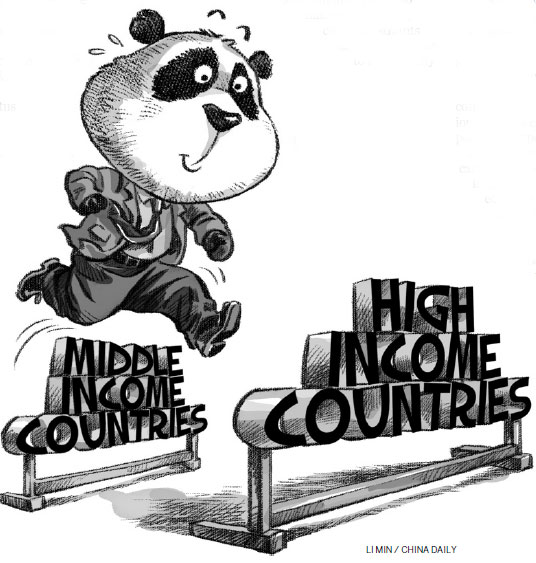High-income status an achievable dream
Updated: 2016-03-22 07:48
By ERIK BERGLÖF(China Daily)
|
|||||||||

'What if this is 'as good as it gets'?" Jack Nicholson asks, as he walks through his psychiatrist's waiting room in the eponymous film. At the recent meeting of G20 finance ministers in Shanghai, participants were asking much the same question-and not just with regard to medium-term expectations of weak global growth. Many are now wondering whether China's current growth rate will be as good as it gets for a long time to come.
Determining the validity of such fears requires understanding what is driving China's economic slowdown. Some offer a straightforward explanation: China, along with other major emerging economies, has become ensnared in the "middle-income trap", unable to break through to advanced-economy status. But this assumes that some exogenous force or tendency causes countries to become "stuck" at a particular income level-a view that one academic study after another has debunked.
To be sure, countries do often struggle to achieve high-income status. According to the World Bank, only 13 of 101 countries classified as middle income in 1960 had reached high-income status in 2008. Moreover, some middle-income countries, after promising growth, spent decades "trapped" at a certain per capita income level. Argentina, for example, kept pace with the United States in per capita income growth from 1870 to 1940; since then, the gap has been widening steadily. And even countries that make it to high-income status sometimes regress to middle-income levels.
But studies suggest that fast-growing low-income economies are also likely to become fast-growing middle-income economies, and ultimately to graduate to high-income status. An economy gets stuck because it fails to adjust, as the basis for growth changes. In fact, the lack of capacity for self-transformation normally would have been visible at low-income levels, too.
What, exactly, does the needed adjustment entail? While the specifics vary across countries, the innovation-focused Neo-Schumpeterian growth theory, proposed by economists Philippe Aghion and Peter Howitt, offers some important insights.
Aghion and Howitt view innovation as any change that leads to the introduction of new products or processes in the market where a company operates. Countries far from the world technology frontier are better off imitating existing technologies and adapting them to local conditions, but over time such countries must improve their capacity for innovation. Studies have also shown a positive link between innovation and social mobility, and even between innovation and income inequality.
Related Stories
Global CEOs reiterate their faith in Chinese economy 2016-03-21 13:59
China's economy showing signs of improvement: vice premier 2016-03-20 13:41
No need for pessimism on the economy 2016-03-18 08:40
Foreign media drawn to outlook on economy 2016-03-17 08:10
China has policy tools to anchor economy, says Li 2016-03-17 02:08
New growth engines will help economy to restructure, says Premier Li 2016-03-16 12:37
Today's Top News
Inspectors to cover all of military
Britons embrace 'Super Thursday' elections
Campaign spreads Chinese cooking in the UK
Trump to aim all guns at Hillary Clinton
Labour set to take London after bitter campaign
Labour candidate favourite for London mayor
Fossil footprints bring dinosaurs to life
Buffett optimistic on China's economic transition
Hot Topics
Lunar probe , China growth forecasts, Emission rules get tougher, China seen through 'colored lens', International board,
Editor's Picks

|

|

|

|

|

|







